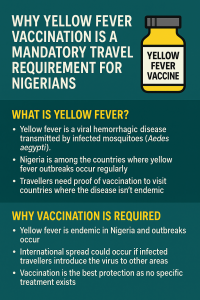Why Yellow Fever Vaccination is a Mandatory Travel Requirement for Nigerians
✈️ A Story Many Travellers Can Relate To
Dayo, a 34-year-old Nigerian, was preparing for his long-awaited trip to Brazil when his travel agent called with bad news: his documents were incomplete because his yellow card certificate was missing.
He was shocked and frustrated. “I’ve submitted every document! Why is this yellow card such a big deal?” he asked.
That simple question opens up an important conversation: Why is yellow fever vaccination mandatory for Nigerians travelling to certain countries?
What is Yellow Fever?
Yellow fever is a viral hemorrhagic disease (similar to Ebola) transmitted by infected Aedes aegypti mosquitoes.
Nigeria is one of several countries where yellow fever outbreaks occur regularly, and the disease remains a major public health concern.
Travellers from Nigeria who plan to visit countries where yellow fever is not endemic must show proof of vaccination through a yellow card certificate.
Yet, many Nigerians still don’t realise that this small yellow booklet is a crucial travel document, as essential as a passport or visa.
Why Yellow Fever Vaccination is Required for Nigerians
Yellow fever is endemic in Nigeria, meaning the virus circulates continuously in the environment. Occasional outbreaks lead to nationwide vaccination campaigns to control transmission.
When an unvaccinated traveller from Nigeria visits a country where yellow fever isn’t common, there’s a risk of importing the virus into that country.
This could expose people who have no immunity and cause new outbreaks in previously unaffected areas.
There’s also no specific treatment for yellow fever, only supportive care.
This makes prevention through vaccination the best and only effective protection.
The Legal Side: International Health Regulations (IHR 2005)
Some travellers joke, “I don’t need the shot, just give me the certificate.”
But here’s the truth: this isn’t optional, it’s international law.
Under the World Health Organisation’s International Health Regulations (IHR 2005), yellow fever is the only disease that legally requires proof of vaccination for international travel.
Countries have the authority to:
-
Deny entry to unvaccinated travellers from risk zones (like Nigeria).
-
Request valid yellow cards at airports and border posts.
-
Quarantine travellers who fail to comply.
Your yellow card certificate is officially known as the International Certificate of Vaccination or Prophylaxis (ICVP). Immigration officers will check it upon arrival and verify its authenticity.
Trying to bypass the system with fake documents isn’t just risky — it’s a violation of international law.
Why It’s Especially Important for Nigerians
Nigeria has recorded recurrent yellow fever outbreaks in states such as Bauchi, Delta, Benue, and Edo. Because of this, the country is classified by the WHO as high-risk for yellow fever transmission.
As a result, many countries, especially in South America, Asia, and the Middle East, require Nigerian travellers to show proof of vaccination before entry or even during layovers.
This isn’t just about bureaucracy; it’s a global safety measure designed to protect other populations from imported infections.
⚠️ What Happens If You’re Not Vaccinated
Skipping your yellow fever vaccination can lead to serious consequences:
-
❌ You may be denied boarding at the airport.
-
Immigration may refuse your entry upon arrival.
-
You could be quarantined at your own expense.
-
You might miss business meetings or conferences after paying for tickets and hotels.
-
And if you fall ill abroad, medical treatment can be costly — especially without travel insurance.
How Long Does the Vaccine Last?
Good news! The yellow fever vaccine is highly effective and provides lifelong immunity after a single dose.
It becomes valid 10 days after vaccination, and the certificate remains valid for life under the WHO regulations.
Ensure you receive the vaccination at an accredited facility in Nigeria to obtain a legitimate yellow card. To learn more, please contact Inocul8 on +2347063736482 or visit our website and Google page.


Trackbacks & Pingbacks
[…] Book Your Appointment. You can read our last post on why yellow fever vaccination is a mandatory travel requirement for Nigerians. […]
Leave a Reply
Want to join the discussion?Feel free to contribute!